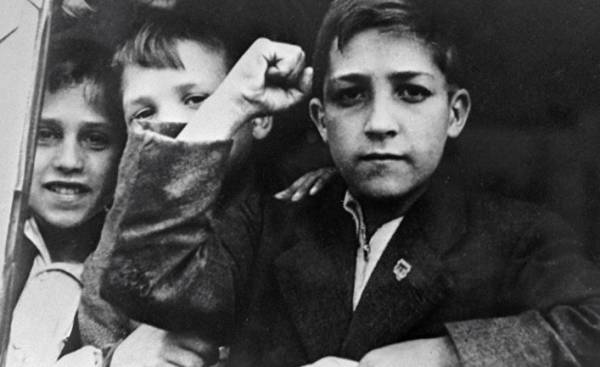
28 September 1956 Cecilio Aguirre Iturbe(Cecilio Aguirre Iturbe) was finally able to see from the deck is jam-Packed and the cargo ship “Crimea” the outlines of the port of Valencia. 20 of his 27 years he lived in the Soviet Union, since then, in the midst of the Civil war in Spain was, together with his brothers and sisters evacuated from the port of Santurtzi to Bilbao in the hope that it is long. That was an amazing landing: willing the Spaniards returned home from the “socialist Paradise”, but they never met any representative of the authorities, and the Barcelona-based La Vanguardia newspaper the next day wrote about this on the fourth page. The “returnees” looked really worried, and Iturbe could not resist the cry of “long live Spain!” in a crumpled statement to the press. He did not yet know that the hardest was yet to come.
A detailed history of the big operation to return the two thousand Spaniards, exiled in Russia, had yet to write. Journalist Rafael Moreno Izquierdo (Madrid, 1960) for many years has studied documents from archives and personal testimonies gathered, to tell this touching, strange and sad story in the book “Children of Russia” (Crítica, 2016), which appeared on the shelves of Spanish bookstores. The details of this large-scale operation during the cold war, which was forced to operate two ideologically antagonistic powers with questionable results. “It is naïve to attempt to characterize the return of the Spaniards in the Soviet Union as a success or failure. Actually it was about the impossible dream, if only because over time too much has changed, and they returned not back to where we left. It was rather an attempt to rethink their existence, the boundaries that divide us or unite, what we yearn and regret”. By the way, returned not only children whose parents were sent to the USSR away from the horrors of war, but also political exiles, sailors, pilots and deserters from the “Blue division”. And a few spies. Not all of them were able to adapt.
El models: In 1956, at the height of the cold war, two antagonistic States — Spain and the USSR concluded an agreement on the repatriation of thousands of Spaniards. Who lost then, and why?
Rafael Moreno Izquierdo (Rafael Moreno Izquierdo): At that time the Soviet Union was more interested in carrying out such an operation, because, like Spain, sought to be more open after the death of Stalin and with Khrushchev. Wanting to create an image more of a free country, the Soviet Union, contrary to the opinion of the Spanish Communist Party, contributed to the return of the Spanish refugees. Franco until the end could not believe it, and in the first flight sent two agents dressed as doctors from the red cross. But they were too late and the ship left without them. The dictator at first greeted with suspicion, but quickly realized that then, in the mid-fifties, when the regime had begun to liberalize, he can also use this operation for advertising purposes.
— How did the children in the postwar Soviet Union? They really wanted to leave or was it, rather, the idea of their parents?
— In Russia there were three large groups of Spaniards. Those who came with children aged from three to fourteen years, the political emigrants and sailors and pilots, who were trained in the Soviet Union at the time of the civil war in Spain and were forced to stay there. Most aspired to leave and fought for this so-called “children of war”, which, though they were raised as exemplary Soviet citizens, as the vanguard of communism, ready for action, as soon as the fall of francoism in Spain feel Spanish and dreamed of returning home, regardless of its political regime. Their parents remaining in Spain, was in contact, but it turned out that they do not understand each other. Everything has changed, and the newcomers have to face numerous difficulties, especially women in the USSR were able to receive higher education and were independent, and suddenly find themselves in a conservative society where a woman can open Bank account only with the permission of the spouse.
In the book You tell that the Franco government in the period of the revival of political unrest, was the main concern in the repatriation it is the threat to the regime. Was there a reason for concern? Among the immigrants were agents or spies of the Communists?
— The return of the “children of war” coincided with very specific moment in history. The Communist party of Spain, at the insistence of Moscow, just changed the strategy and stopped the armed struggle and attempted to build in Franco’s system, to strike from the inside. At the same time there are the first performances of trade unions, the first strikes and demonstrations. And at this point, arrive two thousand Spaniards, for a long time lived in the USSR, brought up in a hostile Communist ideology which should join all layers of the Spanish society. Not surprisingly, and even naturally, that Franco was scared. Moreover, at that time the country had a law banning Freemasonry and communism, and any political activity was persecuted. In the course of its investigation, I found that, although the majority of returnees were integrated regardless of policy, there were groups who had — voluntarily or forced — instructions from the Communist party of Spain, collaborated with her, and some was from behind bars. I found the documents chronicling the entire chain, whom they obeyed, and also evidence that the KGB has introduced at least ten agents under the guise of “children” to collect information. For a while they did nothing, so as not to attract suspicion to subsequently cooperate with Russia and even to return. But these were not enough.
— The CIA played a key role in the future, and, as You say, hostile, monitoring the returnees. American anti-communism was more paranoid than Spanish?
— For the CIA this return was both a problem and a solution. Problem — because the American bases with nuclear bombers have already been placed in Spain and could become targets of Soviet espionage. But never before has so many people did not appear simultaneously due to the “iron curtain”, after having lived there for a long time. They questioned everyone, all two thousand people and found out about the secret cities, whose existence nobody suspected, munitions factories, ballistic missile systems, airplanes, power plants… Immigrants have become the best source of information for the CIA all during the cold war. No data are available on whether to apply the physical torture during interrogation, most of it was about the awards in the form of housing, employment, closing personal file. We also know that they were set up against each other through threats.
— I met these “children of Russia” at home?
Is very curious, because the regime was trying not to give it much publicity, so it went unnoticed, so no officials to meet the first ship sent was not, and subsequent flights did not even hit the press. In some provinces, particularly in Asturias and the Basque Country, buses with immigrants was met with great joy. The society at first, they were considered “red” and avoided contact. But soon the situation changed, because most of the returnees did not engage in politics and lived a normal life, receive subsidies for housing, and they were granted access to public service. This process took place so quietly that today almost nobody remembers.
— What happened to those who could not adapt and even returned to the Soviet Union? It seems strange, because, in the end, the Spanish dictatorship was less harsh than Soviet totalitarianism. I’m not talking about climate…
— He played the role of several factors. Those Spanish police have dubbed the “tourists” who traveled to Spain to see my family, but with the intention to return to the USSR. The Spanish authorities knew that a large group of people is not going to stay. Another part of the Spaniards was traveling unaccompanied by their families, which the Union was not given permission to travel — mostly to the Soviet men of the Spaniards, but not Vice versa. Many of the Spaniards returned to their husbands. And there were people who simply were not aware of the changes in their country during this time. They were brought up in the country with a planned economy, where I didn’t have to fight for a job and was not afraid to lose her, but in the nascent capitalist system of Spain prices were not fixed, as in Russia. They had to fight for survival, and it was too hard.







